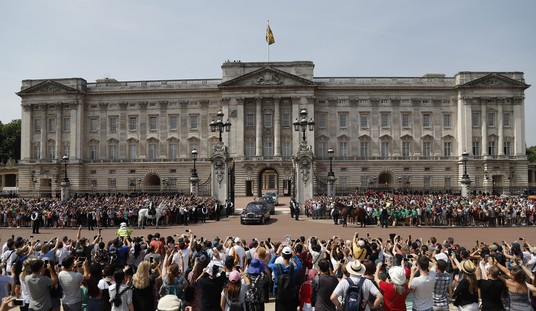UN-authorized strikes against Gaddafi’s military forces began on March 19 as the rebels were on the edge of defeat, a position Gaddafi was in not long before. The West has apparently decided that its mission is not regime change, but a ceasefire that would leave Gaddafi in power. Survival would be a victory for the Libyan dictator, and leave him in an unhinged state to plot his revenge against the rebels and those who backed them by exploiting the limits of the UN engagement.
The chairman of the Joint Chiefs of Staff, Admiral Mike Mullen, said: “It isn’t about seeing him go.” Vice Admiral William Gortney said the objective is to “deny the Libyan regime from using force against its own people” and French President Sarkozy said the “door to diplomacy will reopen when the fighting will stop.”
Sarkozy implied a desire to see regime change, saying the intervention sought to “allow the Libyan people to choose their own destiny,” but the military action is designed to end hostilities — not Gaddafi’s reign. The AP reports that the U.S. hopes the intervention will indirectly bring about his end, stating: “Other top U.S. officials have stressed that a weakened and isolated Gaddafi could be ripe for a coup.”
This is precisely the thinking that left Saddam Hussein in power during the Gulf War, leading to a prolonged military engagement. Like Saddam, Gaddafi will continue to slaughter innocents and act aggressively. He has already said he will replace departing Western businesses with those from China and India so he will not be economically strangled.
It would be a mistake to assume that a ceasefire would end the conflict. The rebels will never surrender their goal of liberating all of Libya, and Gaddafi will never settle for anything less than retaking the entire country. These goals are not reconcilable. Unless the West imposes a ceasefire on the rebels as well, their operations will continue — it is inevitable that portions of regime-controlled territory will be the scene of uprisings and brutal crackdowns. The coalition will then need to choose: protect the rebels as they move forward to support the uprisings; limit military operations to only certain geographic areas and stay out of such battles; or force the rebels to cease attacks.
It is likewise certain that Gaddafi will use other means to wage war on the rebels, such as by sending in assassins and sabotage teams. The bounty on the head of the leader of the Libyan Transitional Council remains. Gaddafi will also be able to take revenge against rebel sympathizers in the territory he holds during a ceasefire. A “no drive zone” can’t cover the whole country, and his thugs can easily travel in civilian vehicles to eliminate their targets. An unconventional war will continue.
Gaddafi will continue to build up his forces unless a long-term blockade is enforced. The Syrian government is thought to have provided him with over two dozen pilots to help turn the tide, and there are accounts of Hezbollah fighters joining his forces. Military flights from Algeria and Belarus are believed by the rebels to have provided shipments of arms that reversed their gains. Gaddafi can agree to a ceasefire, and arm himself for the day that he chooses to break it.
Richard Fernandez made the point that the rebel forces will not control the oil resources, making self-governance in an autonomous area very difficult. Instability like this opens the door to outside influence, including al-Qaeda and other radical Islamic militants. A large amount of the foreign fighters in Iraq were Libyans: over 60 percent of these came from Derna and 24 percent came from Benghazi, the capital of the opposition. One of the debates about the intervention was whether it was better to have Gaddafi or a radical Islamic opponent in power if one should arise. Under a ceasefire, we could have both.
One of the arguments against backing the rebels in their quest to forcibly remove Gaddafi from power is that it will look like imperialism and spark anti-Americanism. The reality is that the failure to act until now has caused a major disillusionment with the U.S.: the former Libyan ambassador to the U.S. said America’s passivity while Libyans were being slaughtered confirmed the negative image of the U.S. in the region. The intervention will repair some of the damage, but if Gaddafi is left in power the Libyans will never forget the lives that were lost as the U.S. hesitated — and the victory they could have won as they requested support during their march to Tripoli. The people of the Middle East assumed the U.S. wanted Saddam in power after it failed to remove him, and the same conclusion will be made if it happens with Gaddafi. The anti-Americanism that President Obama’s Cairo speech aimed to counter will be strengthened.
The world is making a mistake if it thinks Gaddafi will be defanged and humbled by the intervention. He was known as a leading sponsor of terrorism in the 1980s, and though secular himself, he and his media outlets spout jihadist rhetoric. He will be reckless and unpredictable; his insanity appeared to escalate as the uprising progressed. He has threatened to attack air and sea traffic in the Mediterranean and ally with al-Qaeda to declare a jihad against the West if it intervened. It is simply bad strategy to gamble that Gaddafi will forgive his enemies, not seek revenge, and think with a stable mind after a ceasefire.
It must also be considered that every Arab government is analyzing the approach of each regime towards their uprisings. Every leader is concerned and is seeing what works and what does not. If Gaddafi’s rule survives, it will be his methods of mass violence that will be vindicated — you will see it repeated by others. It is probably not a coincidence that the Yemeni and Bahraini governments began using harsher methods once Gaddafi turned his situation around. The Syrian government, which now faces an uprising of its own, will draw the same lesson.
Limiting our objective to a ceasefire will allow a deranged Gaddafi to remain while requiring an expensive, lengthy military engagement that is unsatisfactory to the rebels we are trying to protect. The U.S. and its allies missed one opportunity to help the rebels end Gaddafi and it shouldn’t miss another.









Join the conversation as a VIP Member